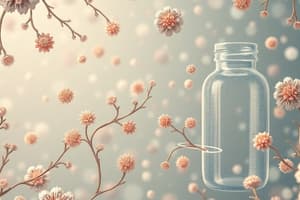Podcast
Questions and Answers
Microbiology is the study of ___________ organisms.
Microbiology is the study of ___________ organisms.
microbial
Single-celled organisms are called ____________.
Single-celled organisms are called ____________.
unicellular
Organisms that lack cells are referred to as ____________.
Organisms that lack cells are referred to as ____________.
acellular
Robert Hooke reported that life’s smallest structural units were called “__________” or “________”.
Robert Hooke reported that life’s smallest structural units were called “__________” or “________”.
What significant discovery did Robert Hooke make in 1665?
What significant discovery did Robert Hooke make in 1665?
Who is recognized as the first person to observe live microorganisms?
Who is recognized as the first person to observe live microorganisms?
Leeuwenhoek referred to the microorganisms he observed as “_____________”.
Leeuwenhoek referred to the microorganisms he observed as “_____________”.
John Needham's experiment suggested that microorganisms could arise spontaneously from ____________.
John Needham's experiment suggested that microorganisms could arise spontaneously from ____________.
What did Lazarro Spallanzani suggest was responsible for the results of Needham’s experiment?
What did Lazarro Spallanzani suggest was responsible for the results of Needham’s experiment?
Louis Pasteur conducted the ____________ experiment to demonstrate that microorganisms are everywhere.
Louis Pasteur conducted the ____________ experiment to demonstrate that microorganisms are everywhere.
What contributions did Louis Pasteur make to microbiology? (Select all that apply)
What contributions did Louis Pasteur make to microbiology? (Select all that apply)
The Germ Theory of Disease was supported by Agostino Bassi and Pasteur, associating microorganisms with specific ____________.
The Germ Theory of Disease was supported by Agostino Bassi and Pasteur, associating microorganisms with specific ____________.
What did Joseph Lister introduce to improve surgical hygiene?
What did Joseph Lister introduce to improve surgical hygiene?
According to Robert Koch, which of the following is part of his postulates? (Select all that apply)
According to Robert Koch, which of the following is part of his postulates? (Select all that apply)
Flashcards are hidden until you start studying
Study Notes
Intended Learning Outcomes
- Identify key scientists and their contributions to microbiology.
- Differentiate types of microorganisms based on unique characteristics.
- Understand the structural composition of prokaryotic cells.
- Describe prokaryotic cells' structure and function.
Overview of Microbiology
- Focuses on organisms including unicellular (single cell), multicellular (cell colonies), and acellular (lacking cells) entities.
Robert Hooke
- Coined the term "cells" after observing them through an improved microscope in 1665.
- His work contributed to the development of the cell theory, which states all living organisms are composed of cells.
Anton Van Leeuwenhoek
- First to observe live microorganisms, naming them "animalcules" using a simple single-lens microscope in 1673.
- Recognized as the "father of microbiology" for his pioneering observations.
Debate on Spontaneous Generation
- Early theorists believed in "abiogenesis," the idea that life could arise from non-living matter.
John Needham
- Conducted experiments claiming microorganisms could spontaneously arise from heated nutrient broth (1745).
- Suggested that vital force is essential for spontaneous generation.
Lazarro Spallanzani
- Repeated Needham's experiments, suggesting contamination was the cause of microbial growth in Needham's flasks.
Concept of Biogenesis
- Louis Pasteur demonstrated that microorganisms are ubiquitous and disproved spontaneous generation through the swan neck experiment.
Contributions of Louis Pasteur
- Verified biological processes, including fermentation and pasteurization.
- Established principles of biogenesis, leading to significant developments in microbiology.
Golden Age of Microbiology
- Between 1857 and 1914, significant advancements occurred, including fermentation processes (sugar + yeast → alcohol + carbon dioxide) and pasteurization (heat treatment to kill bacteria in beverages).
Germ Theory of Disease
- Established by Agostino Bassi and Pasteur, asserting that specific diseases are caused by specific microorganisms.
Joseph Lister
- Introduced antiseptic techniques using carbolic acid in the 1860s to disinfect surgical instruments and dressings.
Robert Koch and Postulates
- Developed Koch’s postulates (1876) to establish a causative relationship between a microorganism and a disease:
- Microorganism must be present in diseased individuals.
- Must be isolated in a pure culture.
- Disease must be reproduced when the microorganism is inoculated into a healthy host.
- Must be re-isolated from the newly diseased host.
Studying That Suits You
Use AI to generate personalized quizzes and flashcards to suit your learning preferences.




